Authors & editors
ANU Press has collaborated with a diverse range of authors and editors across a wide variety of academic disciplines. Browse the ANU Press collection by author or editor.

Honouring a Nation »
A History of Australia's Honours System
Authored by: Karen Fox
Publication date: January 2022
The first detailed history of imperial and national honours in Australia, Honouring a Nation tells the story of the honours system’s transformation from instrument of imperial unity to national institution.
From the extension of British honours to colonial Australasia in the nineteenth century, through to Tony Abbott’s revival of knighthoods in the twenty-first, this book explains how the system has worked, traces the arguments of its supporters and critics, and looks both at those who received awards and those who declined them. Honouring a Nation brings to life a long history of debate over honours, including wrangles over State rights, gender imbalances in honours lists, and the emergence and hardening of the Labor/Liberal divide over British awards, illuminating issues that are still part of Australian life—and of the honours system—today. The history of the honours system is equally the history of the nation, revealing who Australians were, what they have become, what they value, and the things that have unified and divided them.
‘National honours are a fraught recognition of merit. They beg many questions: who decides, why some people are recognised, and others ignored. Honours provide a window to the soul of the nation and invite us to consider who we really are and what we value. These are big issues to ponder. Karen Fox provides many of the answers in this timely, lively and important book.’
— Julianne Schultz AM FAHA, Emeritus Professor Media and Culture, Griffith University
‘Give Karen Fox a gong: for distinguished service to Australian culture in recognition of her authoritative yet entertaining account of how a supposedly egalitarian country embraced knighthoods, OAs and other baubles.’
— Richard White, Associate Professor at the University of Sydney and author of Inventing Australia
‘Karen Fox has written an intelligent, incisive and intriguing account of how Australians have acknowledged and elevated their fellow citizens, from the founding of the first colony to the present day … a work packed with insights about the ever-shifting determinants of social hierarchy, individual merit and public esteem … a thoroughly stimulating read.’
— Stuart Ward, Head of the Saxo Institute, University of Copenhagen
‘At last, a definitive account of the Australian honours system, from the First Fleet to 2021. Honours serve as a prism through which to view imperial strategies, federal rivalries and partisan, class-based and gender politics, with many scandals and controversies along the way. Karen Fox has given us a book that is both topical and compelling on evolving national identity and honours as a symbol of exclusion or inclusion.’
— Marian Sawer AO, Emeritus Professor, The Australian National University
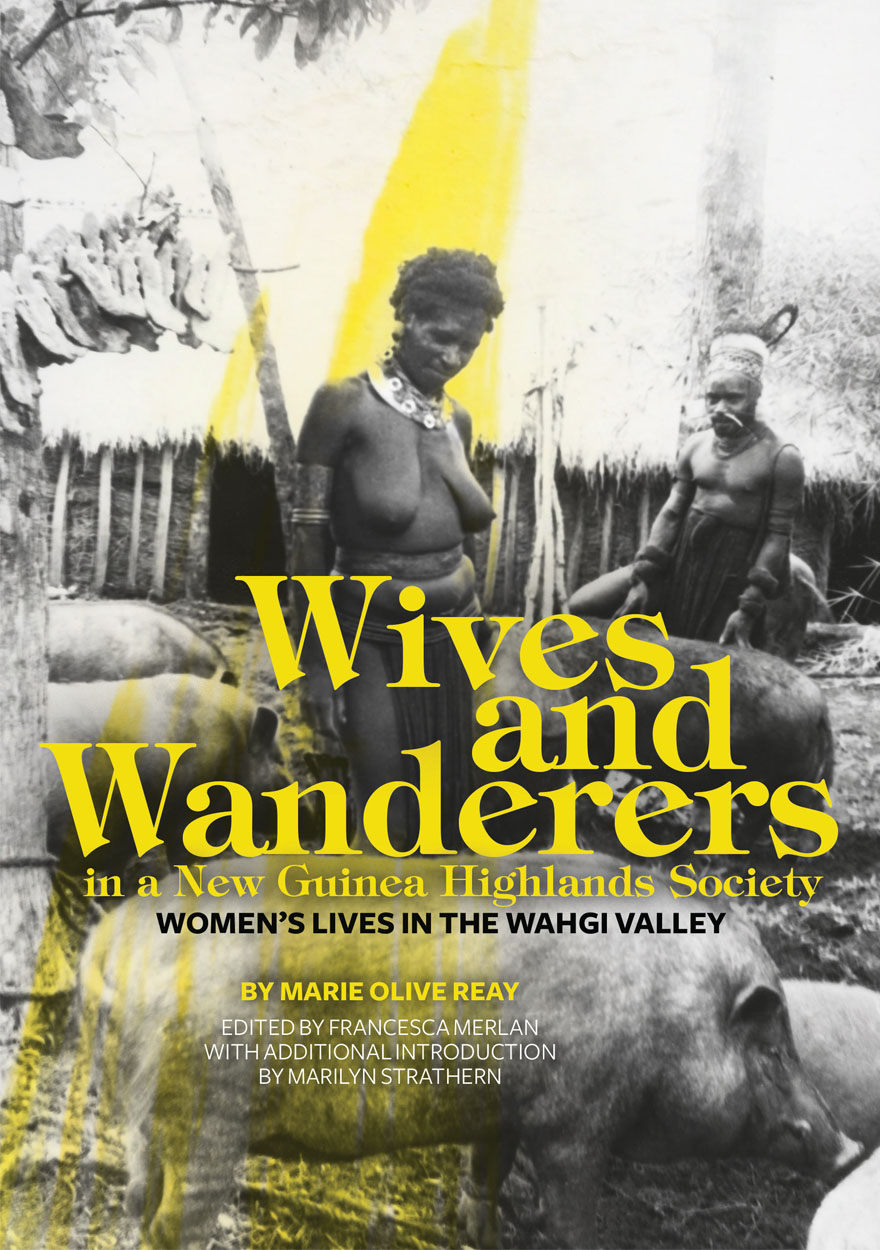
Wives and Wanderers in a New Guinea Highlands Society »
Women’s lives in the Wahgi Valley
Authored by: Marie Olive Reay
Publication date: January 2022
Wives and Wanderers in a New Guinea Highlands Society brings to the reader anthropologist Marie Reay’s field research from the 1950s and 1960s on women’s lives in the Wahgi Valley, Central Highlands of Papua New Guinea. Dramatically written, each chapter adds to the main story that Reay wanted to tell, contrasting young girls’ freedom to court and choose partners, with the constraints (and violence) they were to experience as married women.
This volume provides readable ethnographic material for undergraduate courses, in whole or in part. It will be of interest to students and scholars of gender relations, anthropology and feminism, Melanesia and the Pacific. The material in this book, which Reay had written by 1965 but never published, remains startlingly contemporary and relevant.
Marie Olive Reay was a social anthropologist who did research in Australian Indigenous communities and in the Wahgi Valley in the Central Highlands of Papua New Guinea. Employed at The Australian National University from 1959 to 1988 when she retired, Reay passed away in 2004. In 2011 this manuscript was found in her personal papers, reconstructed and edited by Francesca Merlan, augmented here by an additional introduction by eminent anthropologist of the Highlands, and of gender, Marilyn Strathern.
Had this manuscript appeared when Reay apparently completed it in its present form – around 1965 – it would have been the first published ethnography of women’s lives in the Central Highlands of Papua New Guinea. Its retrieval from Reay’s papers, and availability now, adds a new dimension to works on gender relations in Melanesian societies, and to the history of Australian and Pacific anthropology.

A Genealogy of Bamboo Diplomacy »
The Politics of Thai Détente with Russia and China
Authored by: Jittipat Poonkham
Publication date: January 2022
In 1975, M.R. Kurkrit Pramoj met Mao Zedong, marking the eventual establishment of diplomatic relations and a discursive rupture with the previous narrative of Communist powers as an existential threat. This book critically interrogates the birth of bamboo (bending with the wind) diplomacy and the politics of Thai détente with Russia and China in the long 1970s (1968–80).
By 1968, Thailand was encountering discursive anxiety amid the prospect of American retrenchment from the Indo-Pacific region. As such, Thailand developed a new discourse of détente to make sense of the rapidly changing world politics and replace the hegemonic discourse of anticommunism. By doing so, it created a political struggle between the old and new discourses.
Jittipat Poonkham also argues that bamboo diplomacy – previously seen as a classic and continual ‘tradition’ of Thai-style diplomacy – had its origins in Thai détente and has become the metanarrative of Thai diplomacy since then. Based on a genealogical approach and multi‑archival research, this book examines three key episodes of Thai détente: Thanat Khoman (1968–71), M.R. Kukrit Pramoj (1975–76), and General Kriangsak Chomanan (1977–80). This transformation was represented in numerous diplomatic/discursive practices, such as ping‑pong diplomacy, petro‑diplomacy, trade and cultural diplomacy, and normal visits.
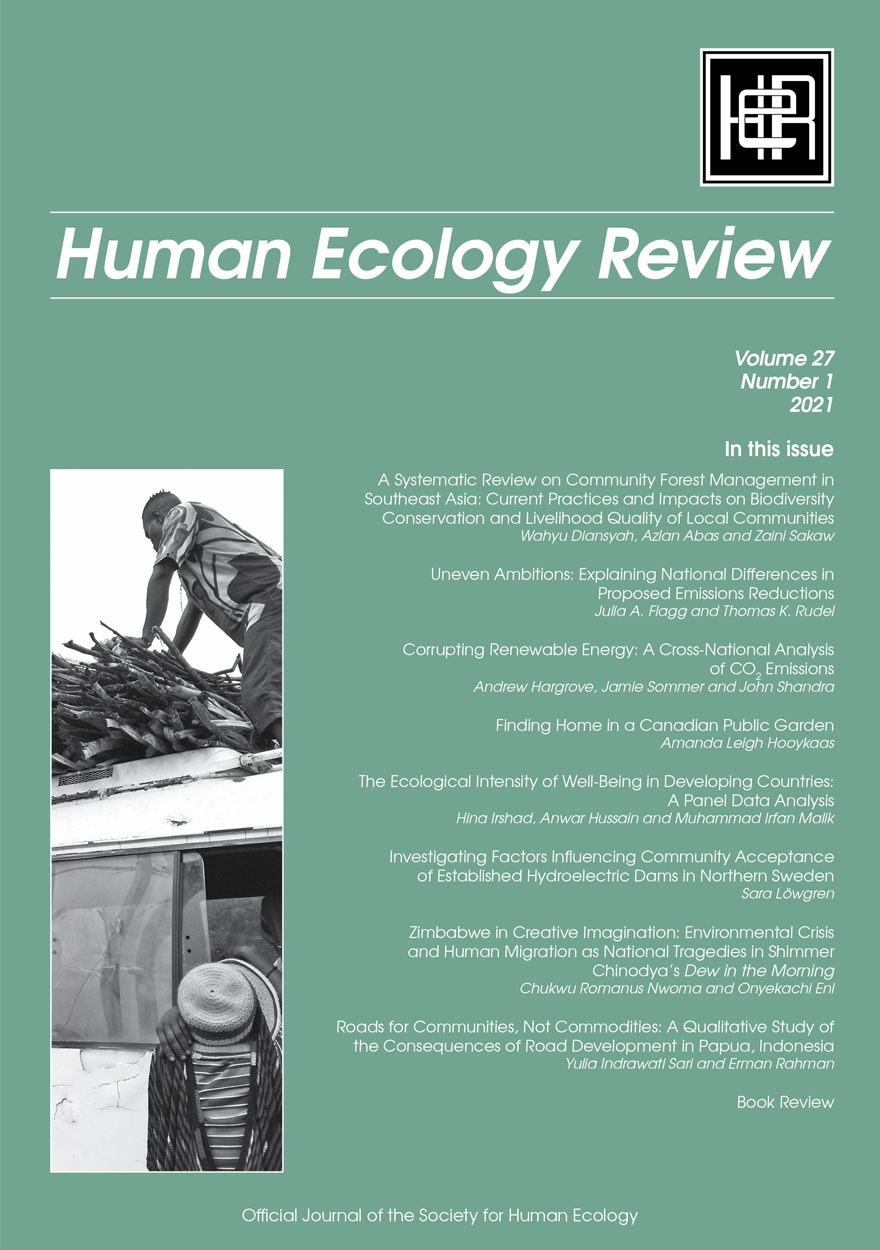
Human Ecology Review: Volume 27, Number 1 »
Publication date: December 2021
This volume of Human Ecology Review represents an internationally diverse range of human ecology research and practice. Diansyah, Abas, and Sakawi present a review of community forest management in Southeast Asia and its impacts on biodiversity conservation community livelihoods. Flagg and Rudel survey national differences in proposed greenhouse gas emission reductions and relative levels of fossil fuel dependencies. On a similar topic, Hargrove, Sommer, and Shandra link national levels of CO2 emissions to levels of executive and public sector corruption, with consequences for transitioning to renewable energy economies. Hooykaas provides a Canadian place-based case study of the role of public gardens in developing a sense of being ‘at home’. Irshad, Hussain, and Malik analyse the ecological intensity of different levels of well-being across a number of developing countries. From Sweden, Löwgren explores a range of factors that encourage or reduce community acceptance of hydroelectric power generation. Nwoma and Eni provide a fascinating discussion on the interconnectedness between literature and Zimbabwe’s environmental crisis. Finally, Sari and Rahaman give us a study of the community impact of road development in Papua, Indonesia.
Download for free
Not available for purchase

Alliances, Nuclear Weapons and Escalation »
Managing Deterrence in the 21st Century
Edited by: Stephan Frühling, Andrew O’Neil
Publication date: December 2021
In an era of great power competition, the role of alliances in managing escalation of conflict has acquired renewed importance. Nuclear weapons remain the ultimate means for deterrence and controlling escalation, and are central to US alliances in Europe and the Indo-Pacific. However, allies themselves need to better prepare for managing escalation in an increasingly challenging geostrategic and technological environment for the US and its allies. While the challenge of great power competition is acute at both ends of Eurasia, adversary threats, geography and the institutional context of US alliances differ. This book brings together leading experts from Europe, Northeast Asia, the United States and Australia to focus on these challenges, identify commonalities and differences across regions, and pinpoint ways to collectively manage nuclear deterrence and potential escalation pathways in America’s 21st century alliances.
‘Nuclear weapons play an important role in deterrence and preventing military conflict between great powers, while also posing an existential threat to humanity. It is vital that we have a nuanced understanding of this important challenge, so that such weapons are never used. This book offers many important perspectives and makes a significant contribution to the overall debate about these powerful weapons.’
— The Hon Julie Bishop, Chancellor, The Australian National University, Former Foreign Minister of Australia
‘This timely book identifies a wide range of challenges US alliances both in the Indo-Pacific and Euro-Atlantic face as they seek to ensure the value of US extended deterrence, particular the US nuclear umbrella, against China and Russia. This unique collection of chapters written by experts in US allies in both regions presents widely varying security perceptions and priorities. To understand such differences is the key to globally strengthen the US alliance systems, which are a significant advantage Washington enjoys over the two competitors.’
— Yukio Satoh, former President of The Japan Institute of International Affairs (JIIA)
‘This is a timely and thoughtful collection of essays that should serve to jumpstart public discussion and debate—the absence of which is widely noted and much bemoaned. Each contributor examines an aspect of the complicated, multifaceted nuclear debate by discussing the range of dilemmas from deterrence to disarmament. The various views set out here are more relevant than ever as Russia, China and the United States flex their nuclear muscles in new and sometimes dangerous ways. This book should be read by anyone interested in the preventing the use of nuclear weapons and understanding complexities of alliances in an increasingly dangerous world.’
— Madelyn Creedon, former Principal Deputy Administrator of the US National Nuclear Security Administration and Assistant Secretary of Defense for Global Strategic Affairs
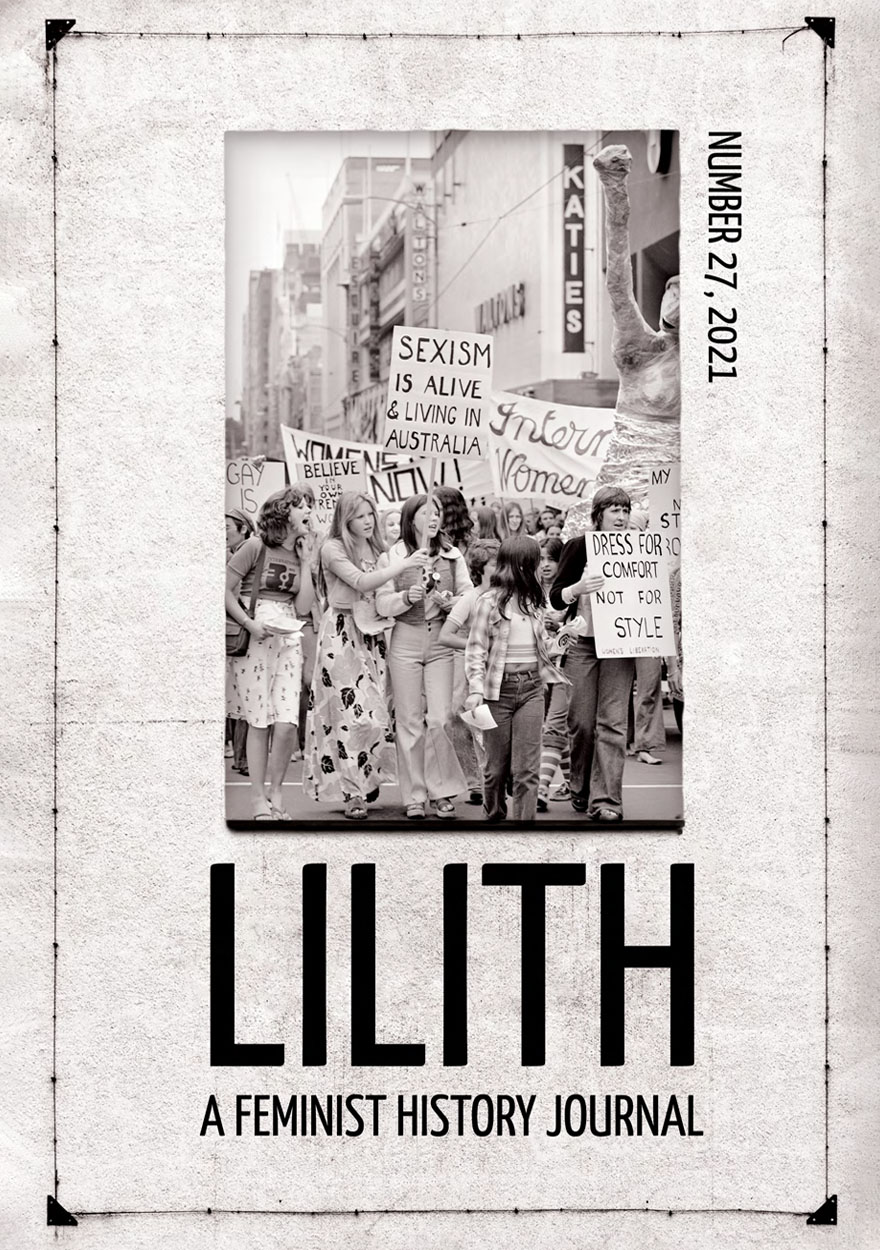
Lilith: A Feminist History Journal: Number 27 »
Publication date: December 2021
This year’s issue covers a rich variety of topics in feminist history, including: the role of place and space in feminist and lesbian identity-making in 1970s’ Melbourne; a decolonising approach to writing the history of women and children in Alice Springs; the importance of recipe exchange in kinship networks in seventeenth-century Ireland; an examination of the life of twentieth-century poet’s muse Katie Anna Lush; the political theatre employed by the Australian Women’s Movement Against Socialism in the 1940s; the targeting of wine advertisements at Australian women in the 1950s and 1960s; and an exploration of the processes of power within natural history societies in nineteenth-century South Australia. There are also two articles that form a special section on the topic of the female frame, one on the role of uniforms for women workers in the transport industry, and the other comparing archetypes of the infanticidal mother in fin-de-siècle Australian and France.
Download for free
Not available for purchase

Agenda - A Journal of Policy Analysis and Reform: Volume 28, Number 1, 2021 »
Edited by: William Coleman
Publication date: December 2021
Agenda is a refereed, ECONLIT-indexed and RePEc-listed journal of the College of Business and Economics, The Australian National University. Launched in 1994, Agenda provides a forum for debate on public policy, mainly (but not exclusively) in Australia and New Zealand. It deals largely with economic issues but gives space to social and legal policy and also to the moral and philosophical foundations and implications of policy.
Subscribe to the Agenda Alerting service if you wish to be advised on forthcoming or new issues.
Download for free
Not available for purchase

Wampar–English Dictionary »
With an English–Wampar finder list
Authored by: Hans Fischer, Bettina Beer
Publication date: December 2021
This ethnographic dictionary is the result of Hans Fischer’s long-term fieldwork among the Wampar, who occupy the middle Markham Valley in Morobe Province, Papua New Guinea (PNG). Their language, Dzob Wampar, belongs to the Markham family of the Austronesian languages. Today most Wampar speak not only Wampar but also PNG’s lingua franca, Tok Pisin. Six decades of Wampar research has documented the extent and speed of change in the region. Today, mining, migration and the commodification of land are accelerating the pace of change in Wampar communities, resulting in great individual differences in knowledge of the vernacular. This dictionary covers largely forgotten Wampar expressions as well as loanwords from German and Jabêm that have become part of everyday language. Most entries contain example sentences from original Wampar texts. The dictionary is complemented by an overview of ethnographic research among Wampar, a sketch of Wampar grammar, a bibliography and an English-to-Wampar finder list.

Japan at War and Peace »
Shidehara Kijūrō and the Making of Modern Diplomacy
Authored by: Ryuji Hattori
Publication date: December 2021
The question of how to maintain the continuity of diplomacy while developing democracy without military intervention is an old and new issue. The challenge can be described as a dilemma between democracy and diplomatic coherence. This dilemma is not unique to the twenty-first century; it has been a constant challenge to the development of democracy. In non-Western countries, democratisation originated in the nineteenth century and has had many successes and failures. After the Russo-Japanese War, political parties began to take power in Japan.
The best embodiment of diplomacy in Japan’s emerging democracy—the development of parliamentary democracy and mass-based democracy—is Shidehara Kijūrō (1872–1951), who served as foreign minister from 1924 to 1927 and from 1929 to 1931, and was prime minister from 1945 to 1946. As a diplomat from the Ministry of Foreign Affairs, Shidehara had long grappled with the issue of how to ensure diplomatic coherence in modern Japan, which was becoming increasingly democratic. Although Shidehara succeeded to some extent in promoting diplomacy in cooperation with the US and the UK under party politics, the rise of the military after the Manchurian Incident forced him to retire for a period. However, after the Pacific War, Shidehara became prime minister of the US-occupied Japan and attempted to restore cooperative diplomacy under party politics. Shidehara came to the conclusion that the way to achieve both democracy and diplomatic coherence was through nonpartisan diplomacy towards peace.
This book examines the tension between diplomacy and democracy, focusing on Shidehara’s life and exploring modern Japan’s footsteps. Shidehara was undoubtedly one of Japan’s most important diplomatic figures.

East Asia Forum Quarterly: Volume 13, Number 4, 2021 »
Publication date: December 2021
Surrounded by great powers, South Korea has weathered the upheaval of the COVID-19 pandemic in its own unique way. Aspirations for greater autonomy and self-reliance are also driving significant changes to Seoul’s political and security postures amid intensifying regional tensions, and serve as a backdrop as South Koreans elect their next president in early 2022. This East Asia Forum Quarterly examines how South Korea is confronting the big challenges of our time, including public health, green energy, political polarisation, minority rights, denuclearisation on the Korean Peninsula and the global rise of K-pop.
Download for free
Not available for purchase
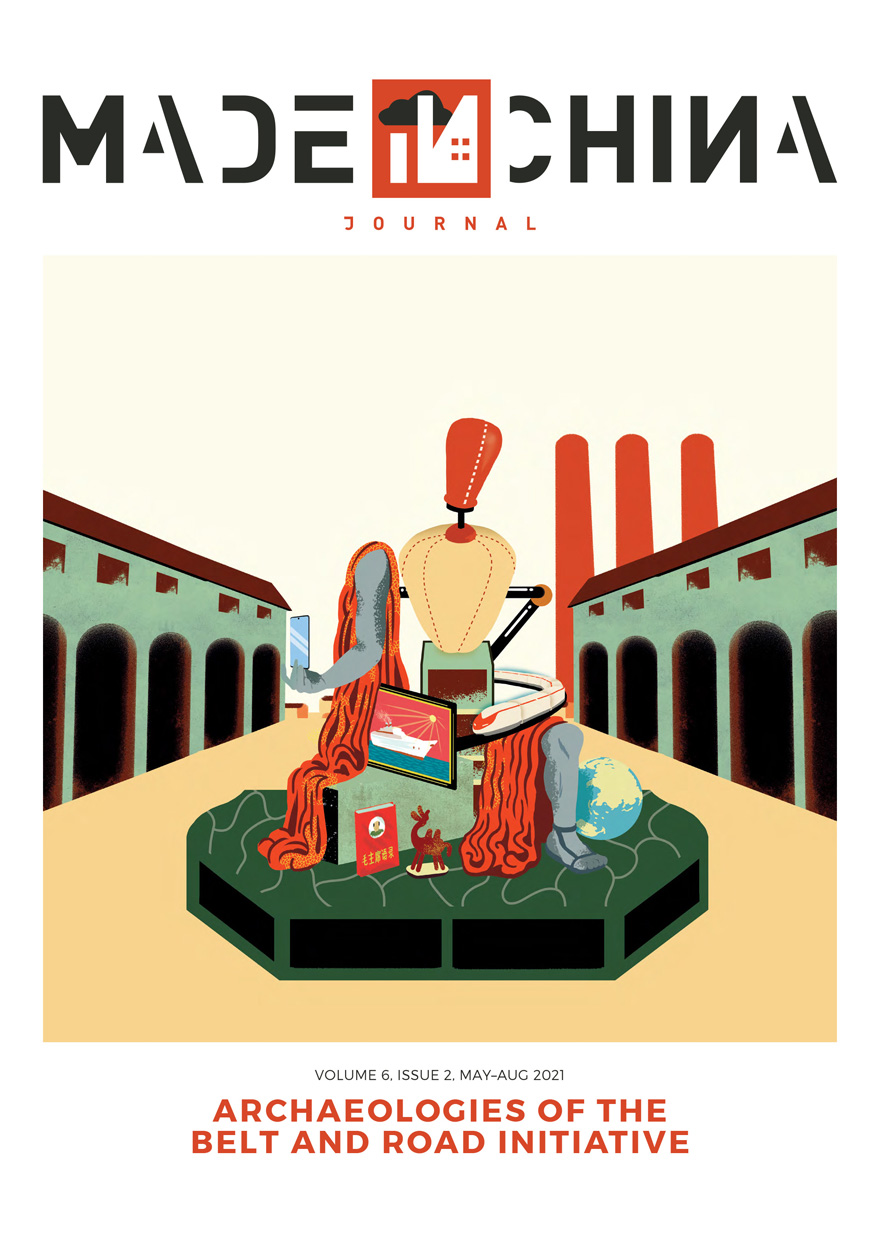
Made in China Journal: Volume 6, Issue 2, 2021 »
Edited by: Ivan Franceschini, Nicholas Loubere
Publication date: December 2021
Since its announcement in 2013, the Belt and Road Initiative (BRI) has become the main lens through which both observers and stakeholders trace China’s global footprint. Whether cheered on as a new engine of economic development in a fraught and increasingly unequal world or frowned on as a masterplan through which the Chinese authorities are attempting to establish global hegemony, the infrastructure component of the BRI has become such an important frame in discussions of Global China that less tangible aspects that are not in its purview tend to be lost or overlooked. One of these neglected dimensions is China’s long history of international engagement aimed at building economic, political, social, and cultural ties in both the Global North and the Global South. Frequently, we tend to forget how the international presence of Chinese actors we are currently observing did not just happen overnight, but was built on decades of experience of China’s interaction with the rest of the world. In the belief that examining these historical precedents can help us shed light on both the continuities and the discontinuities in the practices of today and that only by digging into the dirt of history can we excavate the roots of the dynamics we are witnessing, this issue is dedicated to the ‘archaeologies of the BRI’.
Download for free
Not available for purchase

Fighting Australia’s Cold War »
The Nexus of Strategy and Operations in a Multipolar Asia, 1945–1965
Edited by: Peter Dean, Tristan Moss
Publication date: 2021
In the first two decades of the Cold War, Australia fought in three conflicts and prepared to fight in a possible wider conflagration in Southeast Asia and the Pacific. In Korea, Malaya and Borneo, Australian forces encountered new types of warfare, integrated new equipment and ideas, and were part of the longest continual overseas deployments in Australia’s history. Working closely with its allies, Australia also trained for a large conventional war in Southeast Asia, while a significant percentage of the defence force guarded the Papua New Guinea–Indonesian border. At home, the Defence organisation grappled with new threats and military expansion, while the Australian Security Intelligence Organisation defended the nation from domestic and foreign threats. This book examines this crucial part of Australia’s security history, so often overlooked as merely a precursor to the Vietnam War. It addresses key questions such as how did Australia achieve its security goals at home and in the region in this new Cold War environment? What were the experiences of the services, units and individuals serving in Southeast Asia? How did this period shape Australia’s defence for years to come?

Rote-Meto Comparative Dictionary »
Authored by: Owen Edwards
Publication date: November 2021
This comparative dictionary provides a bottom-up reconstruction of the Rote‑Meto languages of western Timor. Rote-Meto is one low-level Austronesian subgroup of eastern Indonesia/Timor-Leste. It contains 1,174 reconstructions to Proto-Rote-Meto (or a lower node) with supporting evidence from the modern Rote-Meto languages. These reconstructions are accompanied by information on how they relate to forms in other languages including Proto‑Malayo‑Polynesian etyma (where known) and/or out-comparisons to putative cognates in other languages of the region. The dictionary also contains two finder-lists: English to Rote-Meto, and Austronesian reconstructions with Rote-Meto reflexes. The dictionary is preceded by three introductory chapters. The first chapter contains a guide to using the dictionary as well as discussion of the data sources. The second chapter provides a short synchronic overview of the Rote-Meto langauges. The third chapter discusses the historical background of Rote-Meto. This includes sound correspondences, the internal subgrouping of the Rote-Meto family, and the position of Rote-Meto within Malayo-Polynesian more broadly.
Searchable electronic versions of the comparative dictionary are provided in two formats at http://hdl.handle.net/1885/251618. The first electronic version is a Lexique Pro export of the dictionary. The Lexique Pro file contains the same data and information in the book version of the dictionary, but does not contain the introductory chapters. See the "About Rote-Meto" tab of the Lexique Pro file for more information on this version of the dictionary. The second electronic version is a text file. It is formatted as a tab separated file and is intended to be read in spreadsheet format. This text file does not contain all the data and information in other versions of the Rote-Meto Comparative Dictionary and should be used in conjunction with these other versions. See the associated readme for more information on what data is included and excluded from that text file.

International Review of Environmental History: Volume 7, Issue 2, 2021 »
Edited by: James Beattie
Publication date: November 2021
The second issue of International Review of Environmental History for 2021 features contributions on limpets and global environmental history, US bird conservation, soyabean agriculture in South America, settler environmental change in Aotearoa New Zealand, woodlands, communities and ecologies in Australia, and irrigation and agriculture in Australia.
Download for free
Not available for purchase

The Genesis of a Policy »
Defining and Defending Australia's National Interest in the Asia-Pacific, 1921–57
Authored by: Honae Cuffe
Publication date: November 2021
The years 1921–57 marked a period of immense upheaval for Australia as the nation navigated economic crises, the threat of aggressive Japanese expansion and shifting power distributions with the world transitioning from British leadership to that of the US. This book offers a reassessment of Australia’s foreign policy origins and maturation during these tumultuous years. Successive Australian governments carefully observed these global and regional forces. The policy that developed in response was an integrated one—that is, one that sought to balance Australia’s particular geopolitical circumstances with great power relationships and, in assessing the value of these relationships, ensure that the nation’s trade, security and diplomatic interests were served.
Amid the economic and strategic uncertainty of the interwar years, the Australian government acknowledged the shifting power distributions in the global and Asia-Pacific orders and that neither the policies of Britain nor the US completely served the national interest. The nation, accordingly, sought to intervene within the policies of the great powers to ensure its particular interests were secured. This geopolitically informed, interventionist approach, which had its genesis in the 1930s, is traced throughout the 1940s and 1950s, highlighting Australia’s gradual and uneven transition from the British world order to that of the US and the frank assessments made about which relationship best served Australia’s interests.
The Genesis of a Policy identifies a comprehensive and pragmatic approach—albeit not always effectively executed—in Australian foreign policy tradition that has not been previously examined.
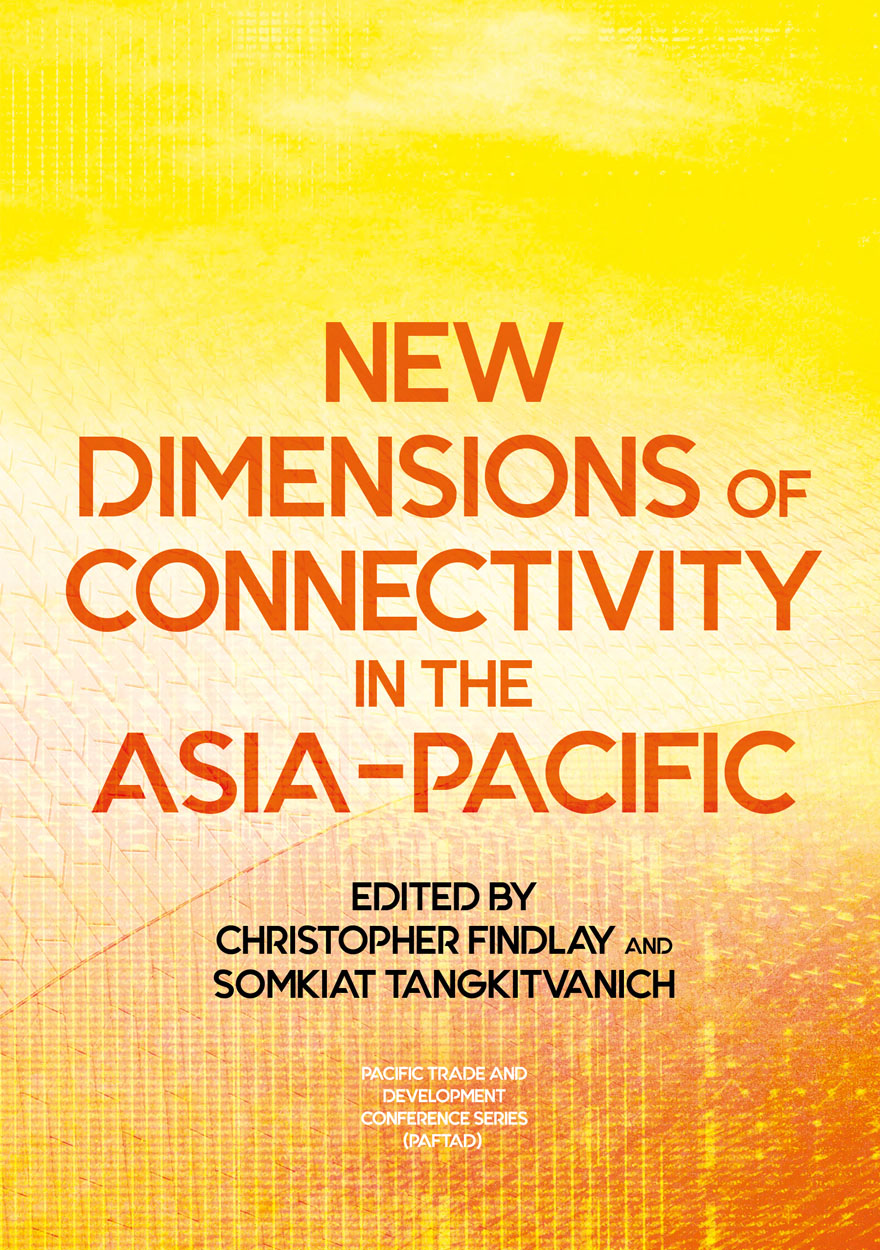
New Dimensions of Connectivity in the Asia-Pacific »
Edited by: Christopher Findlay, Somkiat Tangkitvanich
Publication date: November 2021
There is no bigger policy agenda in the East Asian region than connectivity. Costs of international connectivity are indeed falling, in the movement of goods, services, people and data, leading to greater flows, and to the reorganisation of business and the emergence of new forms of international transactions. There are second-round effects on productivity and growth, and on equity and inclusiveness. Participating in trade across borders involves significant set-up costs and, if these costs are lowered due to falling full costs of connectivity, more firms will participate, which is a driver of productivity growth and innovation at the firm level. Connectivity investments are linked to poverty reduction, since they reduce the costs of participating in markets.
This volume includes chapters on the consequences of changes in both physical and digital connectivity for trade, for the location of economic activity, for forms of doing business, the growth of e-commerce in particular, and for the delivery of new services, especially in the financial sector. A study of China’s Belt and Road Initiative (BRI) is also included. These studies are preceded by an assessment of the connectivity performance in the Asia-Pacific region and followed by a discussion of impediments to investment in projects that contribute to productivity. The collection as a whole provides the basis for a series of recommendations for regional cooperation.
The Pacific Trade and Development (PAFTAD) conference series has been at the forefront of analysing challenges facing the economies of East Asia and the Pacific since its first meeting in Tokyo in January 1968.

History Wars »
The Peter Ryan – Manning Clark Controversy
Authored by: Doug Munro
Publication date: October 2021
‘In 1993, Manning Clark came under severe (posthumous) attack in the pages of Quadrant by none other than Peter Ryan, who had published five of the six volumes of Clark’s epic A History of Australia. In applying what he called “an overdue axe to a tall poppy”, Ryan lambasted the History as “an imposition on Australian credulity” and declared its author a fraud, both as a historian and a person. This unprecedented public assault by a publisher on his best-selling author was a sensation at the time and remains lodged in the public memory. In History Wars, Doug Munro forensically examines the right and wrongs of Ryan’s allegations, concluding that Clark was more sinned against than sinning and that Ryan repeatedly misrepresented the situation. More than just telling a story, Munro places the Ryan-Clark controversy within the context of Australia’s History Wars. This book is an illuminating saga of that ongoing contest.’
— James Curran, University of Sydney
‘The Ryan-Clark controversy … speaks to the place of Manning Clark in Australia’s national imagination. Had Ryan taken his axe to another historian, it’s unlikely that we would be still talking about it 30 years later. But Clark was the author and keeper of Australia’s national story, however imperfect his scholarship and however blinkered that story. Few, if any, historians in the Anglo-American world have occupied the space that Clark occupied by dint of will, force of personality, and felicity of pen.’
— Donald Wright, University of New Brunswick
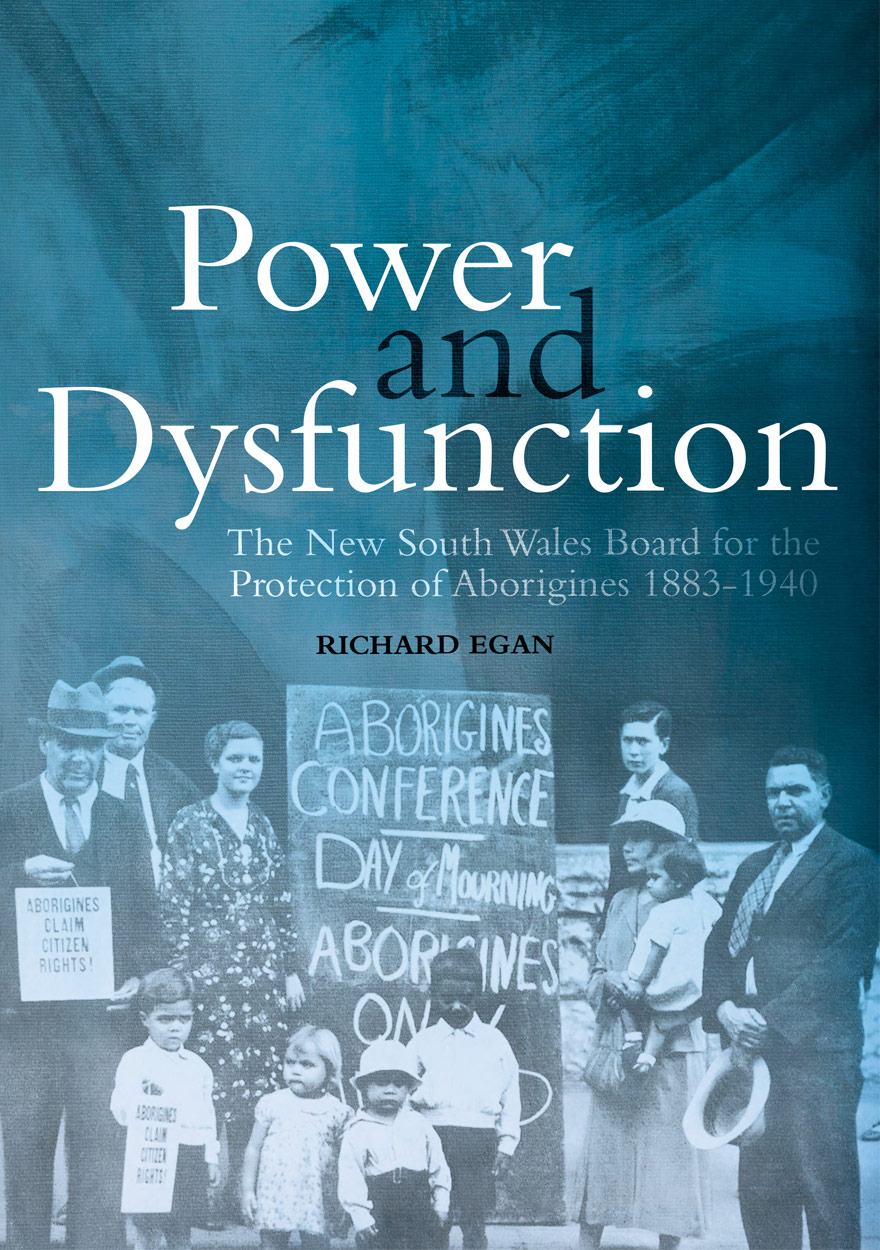
Power and Dysfunction »
The New South Wales Board for the Protection of Aborigines 1883–1940
Authored by: Richard Egan
Publication date: October 2021
In 1883, the New South Wales Board for the Protection of Aborigines was tasked with assisting and supporting an Aboriginal population that had been devastated by a brutal dispossession. It began its tenure with little government direction – its initial approach was cautious and reactionary. However, by the turn of the century this Board, driven by some forceful individuals, was squarely focused on a legislative agenda that sought policies to control, segregate and expel Aboriginal people. Over time it acquired extraordinary powers to control Aboriginal movement, remove children from their communities and send them into domestic service, collect wages and hold them in trust, withhold rations, expel individuals from stations and reserves, authorise medical inspections, and prevent any Aboriginal person from leaving the state.
Power and Dysfunction explores this Board and uncovers who were the major drivers of these policies, who were its most influential people, and how this body came to wield so much power. Paradoxically, despite its considerable influence, through its bravado, structural dysfunction, flawed policies and general indifference, it failed to manage core aspects of Aboriginal policy. In the 1930s, when the Board was finally challenged by Aboriginal and non-Aboriginal groups seeking its abolition, it had become moribund, paranoid and secretive as it railed against all detractors.
When it was finally disbanded in 1940, its 57-year legacy had touched every Aboriginal community in New South Wales with lasting consequences that still resonate today.
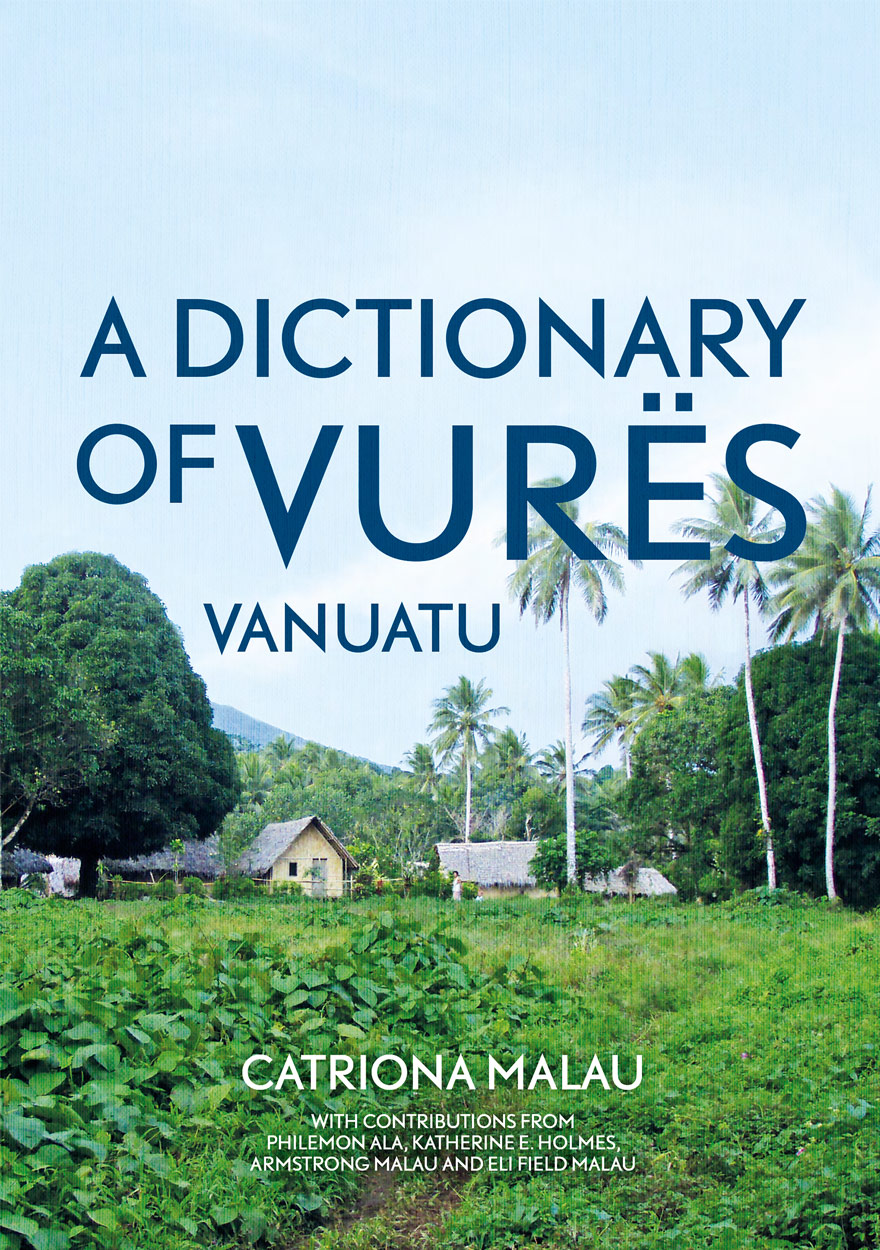
A Dictionary of Vurës, Vanuatu »
Authored by: Catriona Malau
Publication date: September 2021
This is a trilingual dictionary of Vurës, with meanings provided in both English and Bislama, the national language of Vanuatu. Vurës is an Oceanic language spoken on the island of Vanua Lava in Vanuatu. The dictionary is a companion volume to A Grammar of Vurës, Vanuatu (Malau 2016). There is no established tradition of writing in Vurës and most speakers are not literate in their own language. This dictionary is intended to have a dual purpose: to support the learning of literacy skills in the Vurës community, and as a reference work for linguists.
There are four parts to the dictionary. The main part is the most comprehensive and provides the English and Bislama definitions of Vurës words, as well as example sentences for many of the entries, additional encyclopaedic information, scientific names for identified species, lexical relations, and etymological information for some entries. The dictionary contains approximately 3,500 headwords and has a strong emphasis on flora and fauna with close to a third of the entries belonging to these semantic domains. The dictionary has benefited from collaboration with a marine biologist and botanists, who have provided scientific identifications for named species. The main dictionary is followed by English–Vurës and Bislama–Vurës finderlists. The final part of the dictionary is a thesaurus, in which Vurës words are grouped according to semantic categories. The thesaurus has been included primarily so that it can be used to support teaching of literacy skills and cultural knowledge within the community.

The Federated States of Micronesia’s Engagement with the Outside World »
Control, Self-Preservation and Continuity
Authored by: Gonzaga Puas
Publication date: September 2021
This study addresses the neglected history of the people of the Federated States of Micronesia’s (FSM) engagement with the outside world. Situated in the northwest Pacific, FSM’s strategic location has led to four colonial rulers. Histories of FSM to date have been largely written by sympathetic outsiders. Indigenous perspectives of FSM history have been largely absent from the main corpus of historical literature. A new generation of Micronesian scholars are starting to write their own history from Micronesian perspectives and using Micronesian forms of history. This book argues that Micronesians have been dealing successfully with the outside world throughout the colonial era in ways colonial authorities were often unaware of. This argument is sustained by examination of oral histories, secondary sources, interviews, field research and the personal experience of a person raised in the Mortlock Islands of Chuuk State. It reconstructs how Micronesian internal processes for social stability and mutual support endured, rather than succumbing to the different waves of colonisation. This study argues that colonisation did not destroy Micronesian cultures and identities, but that Micronesians recontextualised the changing conditions to suit their own circumstances. Their success rested on the indigenous doctrines of adaptation, assimilation and accommodation deeply rooted in the kinship doctrine of eaea fengen (sharing) and alilis fengen (assisting each other). These values pervade the Constitution of the FSM, which formally defines the modern identity of its indigenous peoples, reasserting and perpetuating Micronesian values and future continuity.

Leading from the North »
Rethinking Northern Australia Development
Edited by: Ruth Wallace, Sharon Harwood, Rolf Gerritsen, Bruce Prideaux, Tom Brewer, Linda Rosenman, Allan Dale
Publication date: September 2021
Leading from the North aims to improve public dialogue around the future of Northern Australia to underpin robust and flexible planning and policy frameworks. A number of areas are addressed including social infrastructure, governance systems, economic, business and regional development, climate and its implications, the roles and trends in demography and migration in the region.
This book not only speaks to the issues of development in Northern Australia but also other regional areas, and examines opportunities for growth with changing economies and technologies.
The authors of this book consist of leading researchers, academics and experts from Charles Darwin University, The Australian National University, James Cook University, the Australian Institute of Marine Science and many other collaborative partners.
Many of the authors have first-hand experience of living and working in Northern Australia. They understand the real issues and challenges faced by people living in Northern Australia and other similar regional areas. Backed by their expertise and experience, the authors present their discussions and findings from a local perspective.
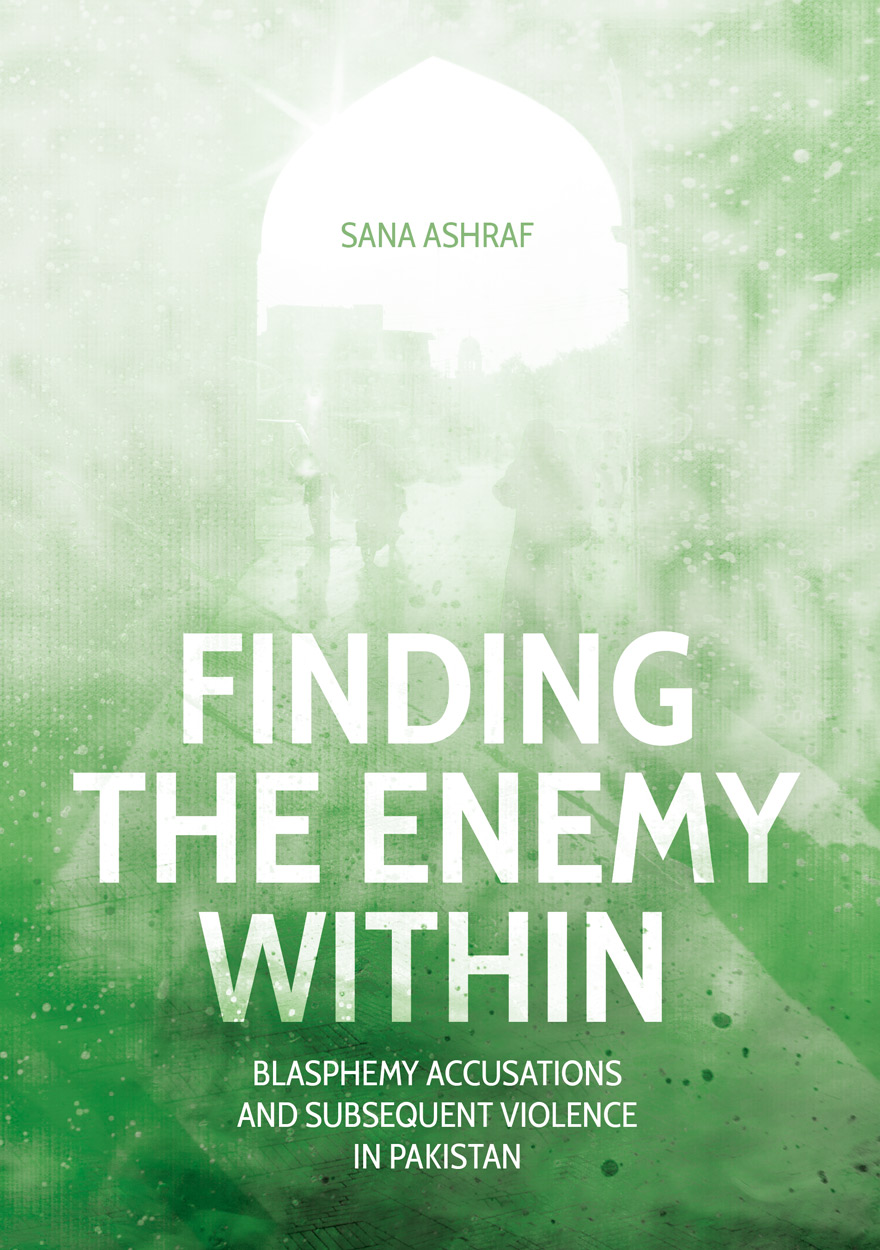
Finding the Enemy Within »
Blasphemy Accusations and Subsequent Violence in Pakistan
Authored by: Sana Ashraf
Publication date: September 2021
In the past decade, Pakistan has witnessed incidents such as the public lynching of a student on a university campus, a Christian couple being torched alive, attacks on entire neighbourhoods by angry mobs and the assassination of a provincial governor by his own security guard over allegations of blasphemy. Finding the Enemy Within unpacks the meanings and motivations behind accusations of blasphemy and subsequent violence in Pakistan.
This is the first ethnographic study of its kind analysing the perspectives of a range of different actors including accusers, religious scholars and lawyers involved in blasphemy-related incidents in Pakistan. Bringing together anthropological perspectives on religion, violence and law, this book reworks prevalent analytical dichotomies of reason/emotion, culture/religion, traditional/Western, state/nonstate and legal/extralegal to extend our understanding of the upsurge of blasphemy-related violence in Pakistan.
Through the case study of blasphemy accusations in Pakistan, this book addresses broader questions of difference, individual and collective identities, social and symbolic boundaries, and conflict and violence in modern nation-states.

Linguistic Organisation and Native Title »
The Wik Case, Australia
Authored by: Peter Sutton, Kenneth Locke Hale
Publication date: September 2021
Classical Aboriginal societies in Australia have commonly been described in terms of social organisation and local organisation. This book presents rich detail on a third and related domain that has not been given the same kind of attention: linguistic organisation.
Basing their analyses on fieldwork among the Wik peoples of Cape York Peninsula, north Australia, Peter Sutton and Ken Hale show how cosmology, linguistic variation, language prehistory, clan totemic identities, geopolitics, land use and land ownership created a vibrant linguistic organisation in a classical Aboriginal society.
This has been a society long in love with language and languages. Its people have richly imbued the domain of rights and interests in country—the foundations of their native title as recognised in Australian law—with rights and interests in the abundance of languages and dialects given to them at the start of the world.

East Asia Forum Quarterly: Volume 13, Number 3, 2021 »
Publication date: September 2021
The 2020 Olympics put a spotlight on Japan’s crisis governance capabilities. Whether it be in the sphere of social issues, domestic political economy or foreign policy, Japan’s capacity to manage ‘slow-burn’ crises will be a primary test for the country’s policymakers and citizens alike in coming years. This edition of East Asian Forum Quarterly looks at these challenges, including the COVID-19 pandemic, digital governance, women’s rights in the #MeToo era, foreign policy, natural disaster response and tone-party control of Japan’s government.
Download for free
Not available for purchase

China’s Challenges in Moving towards a High-income Economy »
Edited by: Ligang Song, Yixiao Zhou
Publication date: September 2021
With its per capita income surpassing US$10,000, China has now drawn up ambitious plans to further lift its income to the level of developed countries. Yet various constraints need to be overcome if China is to build on the achievements of the last 40 years and further boost its growth potential. Besides these constraints, the year 2020 saw human societies hit heavily by the COVID-19 pandemic and the global economy caught off guard and dipped into recessions caused by lockdown measures for controlling the spread of the pandemic. Nations around the world have experienced grave loss of human life and lockdown measures have knocked economies from their normal growth trajectories. Even as the pandemic continues to unfold, all signs point to China as being the first major economy to have emerged out of the crisis. But many questions remain. Has the Chinese economy emerged from the pandemic crisis relatively unscathed? What are the long-term prospects for its economy? This year’s Update book, China’s Challenges in Moving towards a High-income Economy, explores the challenges faced by the Chinese economy in the transition towards a high-income economy, including agricultural development, finance and fiscal system reform, RMB internationalisation, trends in urbanisation, as well as topics related to innovation, corporate sector development and market competition. China’s growth experience has been full of exciting changes and important lessons for reform and structural changes, and this year’s China Update is again the way to gain insights into these.



